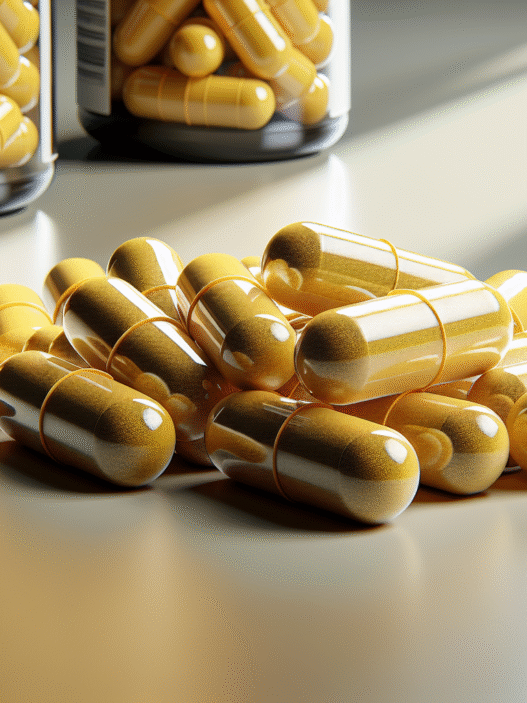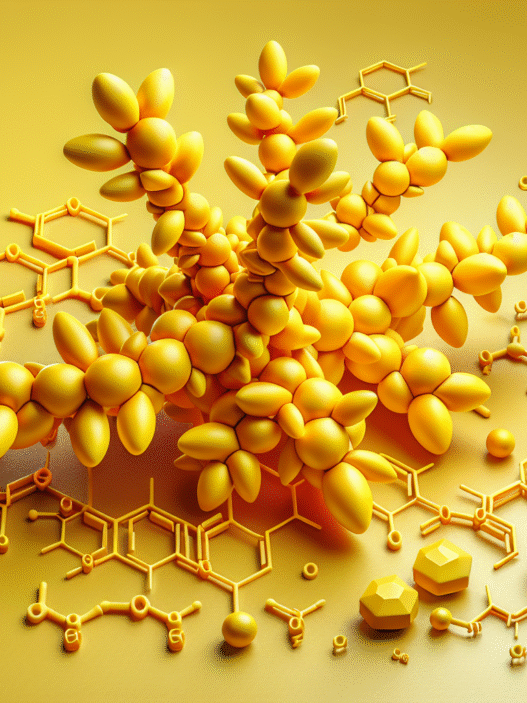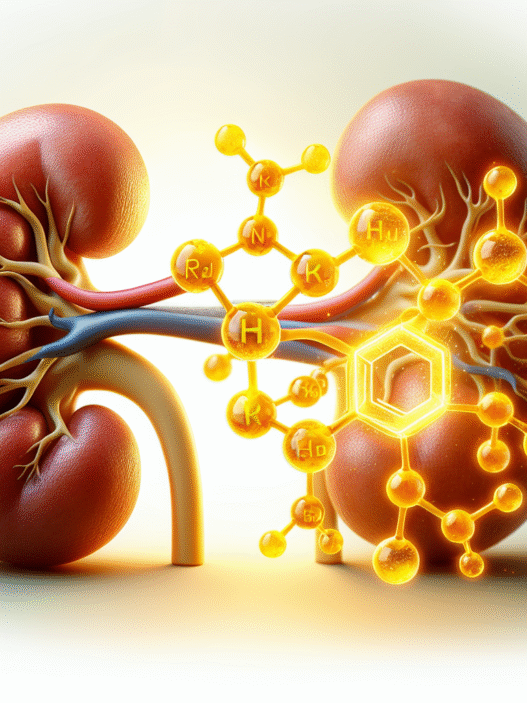Understanding Berberine
Introduction to Berberine
Berberine is a natural compound derived from several plants, most notably the bark of Berberis vulgaris L.. This compound has been utilized in traditional medicine for centuries but has gained recognition in modern times for its potential health benefits. Healthline highlights that berberine is associated with various health advantages, such as lowering blood sugar, aiding in weight loss, and improving heart health.
Berberine functions at the molecular level by activating an enzyme called AMP-activated protein kinase (AMPK). This enzyme plays a crucial role in regulating metabolism, which is key to understanding how berberine can impact conditions like type 2 diabetes and metabolic syndrome.
Mechanisms of Action
The mechanisms through which berberine operates are diverse, influencing multiple body systems. Some of the primary actions of berberine include:
-
Regulating Blood Sugar: Evidence from clinical trials indicates that berberine may have glucose-lowering effects comparable to certain diabetes medications Examine. It enhances insulin sensitivity and reduces glucose production in the liver.
-
Improving Lipid Levels: Berberine has been shown to effectively lower LDL cholesterol and triglycerides. Its lipid-lowering properties have been compared to conventional lipid medications but with significantly lower toxicity NCBI.
-
Supporting Weight Loss: By enhancing metabolic fitness and promoting fat loss, particularly in individuals with obesity, berberine aids in weight management. Studies suggest that users may experience significant reductions in body weight and BMI.
To summarize the effects of berberine, here is a table outlining the primary mechanisms of action:
| Mechanism | Effect |
|---|---|
| Blood Sugar Control | Lowers blood glucose levels |
| Lipid Regulation | Reduces LDL cholesterol and triglycerides |
| Weight Management | Aids in fat loss and improves obesity metrics |
Berberine’s multifaceted functions make it a popular supplement among those interested in holistic wellness and functional medicine. Its potential benefits extend to common health concerns such as type 2 diabetes, lipid management, and even conditions like polycystic ovary syndrome, as highlighted by recent research Medical News Today.
Health Benefits of Berberine
Berberine has garnered attention for its potential health benefits, particularly in areas related to diabetes management, cholesterol levels, and blood pressure regulation. This section explores these aspects in detail.
Impact on Diabetes
Berberine may have beneficial effects on diabetes management by lowering blood sugar levels and improving insulin resistance. Research indicates that this compound can play a role in controlling blood glucose levels, making it a viable option for individuals with type 2 diabetes. While more research is needed to fully understand its therapeutic potential in diabetes treatment, preliminary findings suggest it can be an effective adjunct therapy.
| Study Aspect | Result |
|---|---|
| Fasting Blood Sugar | Decreased by 20-30% in several studies |
| HbA1c Levels | Reduced by approximately 0.5-1% |
Effects on Cholesterol Levels
Berberine may help manage cholesterol levels by lowering LDL (bad) cholesterol and triglyceride levels while increasing HDL (good) cholesterol. Studies have shown that participants taking berberine experienced significant reductions in total and LDL cholesterol compared to those on a placebo. This suggests that berberine could be beneficial for heart health and may help combat cardiovascular disease (Medical News Today).
| Cholesterol Type | Change in Levels (Percent) |
|---|---|
| Total Cholesterol | Decreased by 10-25% |
| LDL Cholesterol | Decreased by 15-30% |
| HDL Cholesterol | Increased by 5-15% |
Potential for Blood Pressure
There is emerging evidence that berberine may positively impact blood pressure levels, although specific studies focusing solely on this benefit are limited. By enhancing cardiovascular health and employing its effects on cholesterol and metabolic processes, berberine may indirectly contribute to better blood pressure regulation. More extensive research is necessary to draw definitive conclusions in this area.
| Blood Pressure Metric | Potential Benefit |
|---|---|
| Systolic Pressure | Potentially lowered by 5-10 mmHg |
| Diastolic Pressure | Potentially lowered by 3-8 mmHg |
By understanding the health benefits associated with berberine, individuals can make informed decisions regarding its use. For those considering supplementation, it is crucial to also explore is there a downside to taking berberine? to ensure a balanced approach to health.
Applications of Berberine
Berberine has garnered attention for its potential health benefits, particularly in applications related to obesity and polycystic ovary syndrome (PCOS).
Anti-obesity Effects
Research indicates that berberine may have antiobesity effects, potentially contributing to reductions in weight markers. It has been identified as an appetite suppressant in animal studies, making it a noteworthy supplement for those looking to manage their weight. Berberine acts by influencing the pathways that regulate adipogenesis (fat cell formation) and lipogenesis (fat storage) (Medical News Today).
The mechanism of action includes enhancing AMPK (AMP-activated protein kinase) activity, which plays a crucial role in regulating metabolism. By promoting lipolysis, the process of breaking down fats in the body, berberine may assist individuals in losing unwanted weight and managing obesity.
The following table summarizes some of the potential mechanisms and effects of berberine on body weight:
| Mechanism | Effect |
|---|---|
| Appetite Suppression | May reduce food intake, leading to weight loss. |
| Downregulation of Adipogenesis | Inhibits the formation of new fat cells. |
| Enhancement of Lipolysis | Increases fat breakdown in existing fat cells. |
| Inhibition of Cholesterol Synthesis | May improve metabolic health by impacting lipid levels. |
Treatment of Polycystic Ovary Syndrome (PCOS)
Berberine has also shown promise in the management of polycystic ovary syndrome (PCOS), a condition that affects hormone levels and can lead to weight gain, insulin resistance, and irregular menstrual cycles. Preliminary studies suggest that berberine can help lower blood sugar levels by improving insulin sensitivity, which is particularly beneficial for women with PCOS.
In addition to its effects on insulin, berberine’s ability to influence other metabolic markers makes it a potential therapeutic option for women dealing with this condition. It may help alleviate symptoms associated with PCOS by regulating menstrual cycles and improving ovulation rates.
For further insights into berberine’s interactions with other conditions, explore our sections on is berberine bad for heart? and who shouldnt take berberine?. Understanding these aspects allows for a more holistic view of berberine’s application in functional medicine and holistic wellness.
Considerations with Berberine
When exploring the use of berberine, it’s crucial to consider its interactions with medications and potential side effects. Understanding these aspects will aid in making informed decisions about incorporating berberine into a wellness regimen.
Interaction with Medications
Berberine has the potential to interact with various medications, which may enhance or diminish their effects. Common interactions include:
| Medication Type | Potential Interaction |
|---|---|
| Cyclosporine | Berberine may decrease the breakdown of cyclosporine, increasing its effects and side effects. |
| Diabetes Medications | Berberine may alter how quickly the liver processes diabetes medications, potentially causing blood sugar levels to drop too low (WebMD). |
| Antihypertensive Drugs | Berberine may interact with blood pressure medications, leading to a risk of hypotension (WebMD). |
| Blood Thinners | Berberine could slow blood clotting, increasing the risk of bruising and bleeding when combined with anticoagulant medications (WebMD). |
| Sedatives | Berberine might enhance the effects of sedative medications, which can result in excessive sleepiness and potential breathing issues (WebMD). |
Individuals considering berberine should consult with healthcare professionals, especially if they are on any of these medications.
Side Effects and Caution
While berberine is generally considered safe for most people, it can cause side effects in certain individuals. Common side effects include:
| Side Effect | Description |
|---|---|
| Gastrointestinal Discomfort | Some may experience stomach cramps, diarrhea, or constipation when taking berberine. |
| Fatigue | A sensation of tiredness can occur with high doses. |
| Sleepiness | Users may experience drowsiness, particularly if also taking sedatives. |
It is important to approach the use of berberine cautiously. Those with specific health conditions or concerns should review the information on who shouldn’t take berberine to ensure safe usage. Furthermore, for insights on the holistic implications of berberine, health enthusiasts can refer to what does mayo clinic say about berberine?.
Understanding these considerations will help individuals weigh the potential benefits against the risks associated with berberine usage. For those exploring this supplement, continuous monitoring of health conditions and open communication with healthcare providers are advisable.
Comparing Berberine and Metformin
Efficacy in Treating Diabetes
Berberine has gained attention for its efficacy in treating diabetes, particularly type 2 diabetes (T2D). Studies suggest that berberine can lower fasting blood sugar levels by approximately 20% and reduce hemoglobin A1c levels by around 12% when taken at doses averaging 1 gram per day (Healthline). Its glucose-lowering effects are deemed comparable to that of established anti-diabetic medications, including metformin. Evidence from clinical trials indicates that berberine’s efficacy in managing blood glucose levels can match some standard treatments, though further investigations are needed to validate these findings thoroughly (NCBI).
| Treatment | Effect on Fasting Blood Sugar | Effect on HbA1c |
|---|---|---|
| Berberine | 20% reduction | 12% reduction |
| Metformin | Approximately 20% reduction | Similar reduction |
Lipid-Lowering Effects
Berberine also shows promise in reducing cholesterol levels, particularly total and LDL (bad) cholesterol. Clinical observations have indicated that its lipid-lowering capacity might be comparable to that of conventional lipid-lowering medications, featuring lower toxicity profiles. Improvement in blood lipid profiles among individuals with metabolic disorders suggests berberine may be a beneficial supplement for managing cholesterol levels.
| Treatment | Total Cholesterol | LDL Cholesterol |
|---|---|---|
| Berberine | Significant reduction | Significant reduction |
| Metformin | Typically less effective in reducing lipid levels |
Furthermore, despite the positive indications regarding berberine’s efficiency in both blood glucose and cholesterol management, the quality of the trials conducted is variable and warrants caution. For individuals contemplating the use of berberine, it is essential to be informed, considering potential interactions, effectiveness, and safety as highlighted in discussions on is there a downside to taking berberine?.
Berberine in Holistic Health
Historical Use
Berberine has a rich history in traditional medicine and has been utilized across various cultures for centuries. Berberine-containing plants, such as Berberis vulgaris, have been historically used worldwide to treat numerous conditions, including inflammatory disorders, skin diseases, tumors, digestive issues, and respiratory ailments (PMC). This extensive background in herbal medicine highlights the significance of berberine as a natural remedy and its integration into holistic health practices.
Berberis vulgaris, commonly known as barberry, is one of the key sources of berberine. The bark of this plant contains over 8% of alkaloids, with berberine being the most prominent, constituting around 5% of the alkaloids. This particular plant has been recognized for its therapeutic properties and remains a focal point in the study of natural remedies.
Modern Uses and Availability
In contemporary settings, berberine’s relevance extends into pharmacology and medicinal chemistry. It is recognized for its potential in the synthesis of bioactive derivatives and the design of new medications. Presently, berberine is available in various forms, including capsules, powders, and tinctures, making it accessible for those interested in exploring its health benefits.
In the domain of holistic health, berberine is often promoted for its antioxidant properties, which involve reversing lipid peroxidation, inhibiting oxidative stress, and scavenging reactive oxygen species in the body. As a supplement, its potential effects on conditions such as diabetes, cholesterol levels, and weight management have garnered attention among functional medicine and holistic wellness followers. For more information about the potential downsides of berberine, visit our article on is there a downside to taking berberine?.
The increasing availability and research surrounding berberine reinforce its status as a versatile component in holistic health, allowing individuals to incorporate it into their wellness routines effectively.





















